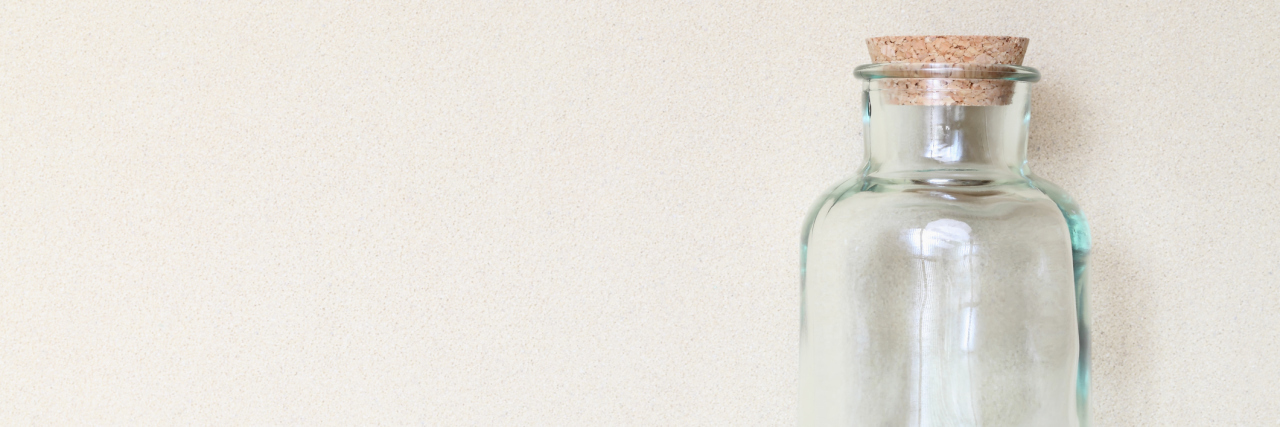Whether or not you are providing assistance to someone who has an illness, in a literal sense, all of us are care givers, aren’t we? We give our care and concern to many people, even sometimes to people who are well. In making dinner for my family, I am caring for them. In listening to a friend who is going through a trying time, I am giving care. This giving of care comes easily to me. What I find difficult is knowing when I need care myself.
• The Mighty’s Caregiving Toolkit
Lately, I’ve been going through a flare-up of my own health conditions. At the same time, I have loved ones coping with physical and mental illness who need my care. Quite frankly, it is exhausting. Dealing with physical pain is draining all on its own. Then there’s the emotional burden of accepting your current limitations and finding ways to adapt. On top of that, being there to provide practical assistance to others who are ill – or even just to listen and offer encouragement – takes energy.
By the end of the day, I often feel like I want to hide from the world. My instinct is to stop and do nothing (which for me means cocooning myself in my blankets and mindlessly having a marathon of television shows I’ve already seen). In the past, I considered doing nothing to mean I was “recharging.” And while I do think there’s merit in resting, I don’t think it’s the most effective way of getting back to where I need to be.
I now try to imagine care as a large jar of water. When you are giving care to others, you are ladling out that water into their cups. When you are expending extra energy because of your own illness, you also need that water and you must ladle it into your own cup. When the jar gets empty, can you refill it by doing nothing?
No. When the jar is empty, that is the time to let others ladle from their jars into yours. The quickest and best way to recover is to be a care receiver.
When caregiving is your nature or your habit, this can be very difficult to do. There are a number of reasons. Perhaps you worry that the people who need care will be less likely to turn to you, or will feel like they have become a burden, if they know you need care too. Maybe you don’t feel like your problems are serious enough compared to theirs. Or you may feel like no one around you is capable of providing care to you. But if you open up, you’ll find that even those with very little water in their jar are often happy to share what they have with you.
Small acts of care from others go a long way toward refilling your jar. Sometimes even just a few words of support can help you carry on. Here’s a personal example. My cousin struggles with chronic illness and has been having a very tough time lately. I’ve been sending her photos and funny anecdotes every few days to keep her spirits up. Last night, I sent her a note letting her know that I was running on empty, and not to worry if she didn’t hear from me for a few days. By this morning, I had three brief emails from her containing photos and words of wisdom to cheer me up. Despite what she’s going through herself, she jumped at the chance to pour water into my jar.
Another loved one is dealing with a mental health crisis and really needs a listening ear. But because I’ve been open with him about what I’m going through, even in the midst of his own experiences, he stops to ask how I’m doing and understands if I need to put my focus on my own needs for a while.
Others help in more practical ways – when I let them know I need it. People who aren’t routinely engaged in giving care may not be as observant as we who give care regularly might be, so we can’t expect them to just intuit the need to step up. My husband and sons are going to assume that I’m fine to keep up my normal routine, unless I tell them otherwise. When I do, they are happy to pick up the slack. With each chore they take over for me, I avoid draining my jar. With each act of care they provide for me directly, they refill my jar.
To varying degrees, everyone that shows me care and concern when I’m low helps to refill my jar. From those that need the care of others the most, the reciprocation may be small, but it’s no less meaningful. From those who are well and able, the contributions can be greater. I just need to be willing to ask, and willing to give them the same privilege of caring for me that I claim in caring for others. I need to set aside my pride and remember that everyone needs care given to them at times.
It’s only by doing what’s necessary to refill my jar that I will have care to offer others. By allowing myself to be a care receiver, when the time comes that these loved ones need care in turn, I will be able to provide it. My jar will be filled and I will again have water to spare.
Getty Image by akiyoko

